
March 30
1814 Allies capture Paris: European forces allied against Napoleonic France march triumphantly into Paris, formally ending a decade of French domination on the Continent.
Napoleon, one of the greatest military strategists in history, seized control of the French state in 1800, and in 1804 was crowned emperor. By 1807, he controlled an empire that stretched across Europe. In 1812, however, he began to encounter the first significant defeats of his military career, suffering through a disastrous invasion of Russia, losing Spain to the Duke of Wellington, and enduring total defeat against an allied force in 1814. Exiled to the island of Elba, he escaped to France in early 1815 and raised a new Grand Army that enjoyed temporary success before its crushing defeat at Waterloo. He was then exiled to the island of St. Helena, where he died six years later. (History.com)
1867 Seward's Folly:
U.S. Secretary of State William H. Seward signs a treaty with Russia for the purchase of Alaska for $7 million. Despite the bargain price of roughly two cents an acre, the Alaskan purchase was ridiculed in Congress and in the press as "Seward's folly," "Seward's icebox," and President Andrew Johnson's "polar bear garden."
The czarist government of Russia, which had established a presence in Alaska in the mid-18th century, first approached the United States about selling the territory during the administration of President James Buchanan, but negotiations were stalled by the outbreak of the Civil War. After 1865, Seward, a supporter of territorial expansion, was eager to acquire the tremendous landmass of Alaska, an area roughly one-fifth the size of the rest of the United States. He had some difficulty, however, making the case for the purchase of Alaska before the Senate, which ratified the treaty by a margin of just one vote on April 9, 1867. Six months later, Alaska was formally handed over from Russia to the United States. Despite a slow start in U.S. settlement, the discovery of gold in 1898 brought a rapid influx of people to the territory, and Alaska, rich in natural resources, has contributed to American prosperity ever since. (History.com)
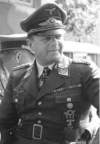
1892 Birth: Erhard Milch: General Field Marshal, Armaments Chief of the Luftwaffe, and Goering's senior deputy. Milch is a Mischling: half-Jewish. After serving in an air force fighter group in WWI, Milch will join the Freikorps in 1919, and in 1920 will command a Police Air Squadron in East Prussia. In 1926 he will join Lufthansa and become a member of its Board of Directors and for the next seven years will play a major role in the company's development. Will join the NSDAP in 1933 and that same year will be appointed by Goering as State Secretary of the Reich Air Ministry, a position he will hold until the end of the Third Reich. The fact that his mother is a Jewess does not prevent his rapid promotion, since Goering persuades his mother to sign a legal document stating he is not her child. In July 1940 he will be promoted to General Field Marshal and in 1942 will become the virtual dictator of transportation in Nazi Germany, along with his close personal friend and political ally, Albert Speer. Sentenced in April 1947 to life imprisonment as a war criminal by a Nuremberg Military Tribunal. In 1951 the American High Commissioner will commute his sentence to fifteen years. He will be released and amnestied in 1954 and work as an industrial consultant in Duesseldorf. Milch will die at Wuppertal-Barmen on January 25, 1972.
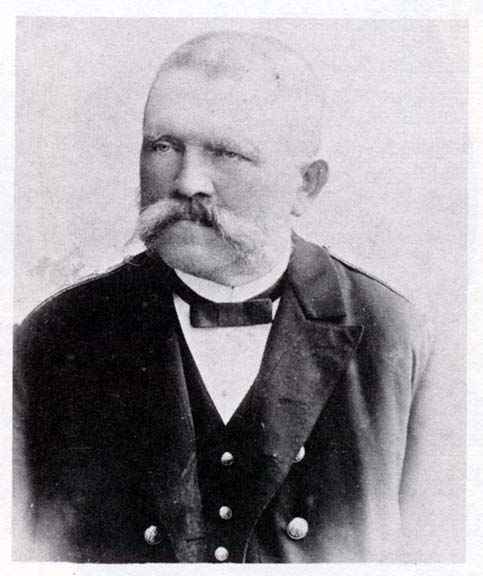
1893 Austrian Customs Agent Alois Hitler is again promoted, this time to an office in Linz, the provincial capital. Since Edmund is so young and Klara still weak from giving birth, Alois goes to Linz by himself, leaving his family in Passau for what turns out to be another year. [For further details, Click here.]
1912 Death: Karl May: German author.

As a boy, Adolf Hitler liked to read about American cowboys and Indians. He was particularly fond of the adventure stories of Karl May, a German who wrote about the American frontier. May, who never visited the United States, concocted a strange "Western" language which the heroes in his novels spoke with a Teutonized Texan drawl. As a schoolboy, Hitler always kept one of May's books concealed under his desk and read it while the teacher was giving lengthy explanations. Hitler was not alone in his admiration for May's stories and heroes. May's books sold by the thousands, and a Old Shatterhand, the main character in May's novels, became the hero of a whole generation of German boys. Few of them, however, could match Hitler in the intensity of his loyalty or the longevity of his infatuation. When Hitler became a chancellor he had a special shelf built in his library to hold, in a place of honor, the whole collection of May's novels, specially bound in vellum. It is known that Hitler read and reread May's stories and highly commended them to his associates and friends. Some authors believe that it was in Karl May's books where Hitler became infatuated with the Swastika. The swastika was used by many North American Indians, and it frequently appeared in illustrations of May's novels. [See: Hitler's Favorite Author.]

1915 World War I: War at Sea: President Wilson protests the blockade of German ports and asks the British to allow neutrals to continue their trade as usual. Britain refuses.
1916 World War I: Various:
Gefreiter Adolf Hitler endures trench warfare in Flanders (Artois) with 3 Company, 16 Reserve Infantry Regiment [List Regiment]. [For further details, Click here.]
General Pershing on Military Operations in Mexico:
Dodd struck Villa's command, consisting of 500, 6 o'clock, March 29th, at Guerrero. Villa, who is suffering from a broken leg and lame hip, was not present. Number Villa's dead known to be thirty, probably others carried away dead. Dodd captured two machine guns, large number horses, saddles, and arms. Our casualties, four enlisted men wounded, none seriously. Attack was surprise, the Villa troops being driven in a ten-mile running fight and retreated to mountains northeast of railroad, where they separated into small bands. Large number Carranzista prisoners, who were being held for execution, were liberated during the fight. In order to reach Guerrero, Dodd marched fifty-five miles in seventeen hours and carried on fight for five hours. Eliseo Hernandez, who commanded Villa's troops, was killed in fight. With Villa permanently disabled, Lopez wounded, and Hernandez dead, the blow administered is a serious one to Villa's band.
1917 World War I: Various:
List Regiment: Gefreiter Adolf Hitler's 16 Reserve Infantry Regiment, 3 Company, fortify trenches near Arras. [For further details, Click here.]
Poland: The Russian provisional government grudgingly accepts the idea of an independent Poland.
1918 World War I: Various:
Allied troops halt Germans at Moreuil Wood:
British, Australian and Canadian troops mount a successful counter-attack against the German offensive at Moreuil Wood, recapturing most of the area and forcing a turn in the tide of the battle in favor of the Allies. [For further details, Click here]
Statement Issued by Lloyd George on Foch's Appointment as Allied Supreme Commander:
For the first few days after the German Army had launched upon our lines an attack unparalleled in its concentration of troops and guns the situation was extremely critical. Thanks to the indomitable bravery of our troops, who gradually stemmed the enemy advance until reinforcements could arrive and our faithful Ally could enter into the battle, the situation is now improved. The struggle, however, is still only in its opening stages, and no prediction of its future course can yet be made. From the first day the War Cabinet has been in constant session and in communication with Headquarters and with the French and American Governments. A number of measures have been taken in concert between the Governments to deal with the emergency. The enemy has had the incalculable advantage of fighting as one army. To meet this the Allies have, since the battle began, taken a most important decision. With the cordial cooperation of the British and French Commanders-in-Chief, General Foch has been charged by the British, French, and American Governments to coordinate the action of the Allied Armies on the Western front. In addition to the action taken to meet immediate needs of the moment, it will be necessary to bring into operation certain measures which have long been in contemplation should a situation such as the present arrive. It is clear that, whatever may happen in this battle, the country must be prepared for further sacrifices to insure final victory. I am certain that the nation will shrink from no sacrifice which is required to secure this result, and the necessary plans are being carefully prepared by the Government and will be announced when Parliament meets. [For further details, Click here.]
1918 World War I: Gefreiter Adolf Hitler's 16 Reserve Infantry Regiment [List Regiment] , 3 Company, joins the battle on the Somme, crossing the captured British line and occupying a position near Tergnier. [For further details, Click here.]
1919 British Prime Minister Lloyd George to Lord Riddell:
The truth is we have got our way . . . the German navy has been handed over, German merchant shipping has been handed over, and the German colonies given up. One of our chief trade competitors has been crippled and our Allies are about to become her biggest creditors. This is no small achievement." (THP)
1928 Birth: Richard Helms: former CIA Director who pilfers Adolf Hitler's silverware, which somehow ends up in the "Skull and Bones" collection. At least that's how the story goes, related by Andrei Navrozov. In truth Hitler had so many place settings made, that any claim that this is indeed the very set Helms brought back with him from Germany must be taken lightly. [For further details, Click here.]
1933 Various:
Church and Reich: Cardinal Faulhaber agrees to accept the text proposed by Bertram on the 25th. Thus this important proclamation appears with the backing of all the German bishops. (Lewy ) Ambassador Diego von Bergen who has returned to Berlin from the Vatican is received by Hindenburg, as well as Hitler. [See: The Church in Nazi Germany.]
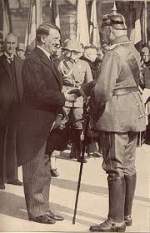
Holocaust: President Hindenburg tries to persuade Hitler to cancel a planned Nazi boycott against German Jewish shops and businesses. (THP)
From Defeat the Enemy of the World! by Julius Streicher:
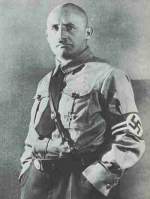
Jewry wanted this battle. It shall have it until it realizes that the Germany of the brown battalions is not a country of cowardice and surrender. Jewry will have to fight until we have won victory. National Socialists! Defeat the enemy of the world. Even if the world is full of devils, we shall succeed in the end. [See: Did Julius Streicher Deserve his Death Sentence?]
1936 Britain announces that it will build 38 new warships.
1940 Various:
Sino-Japanese War: Japan declares Nanking to be the capital of a new Chinese puppet government, nominally controlled by Wang Ching-wei. [See: Countdown to Infamy: Timeline to Pearl Harbor.]
World War II: German Ambassador in the USSR (Schulenburg) to German Foreign Office:
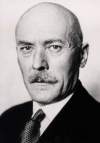
I. I personally believe firmly-as I reported on the occasion of my inquiry of October 17, telegram No. 554 [61]-that Molotov, conscious of his obligation, will visit Berlin as soon as the time and circumstances appear propitious to the Soviet Government. After careful examination of all factors known to me I cannot, however, conceal the fact that I consider the chances slight for the acceptance of an invitation at the present time. My opinion is based on the following considerations:
1. All our observations, particularly the speech of Molotov on March 29, confirm that the Soviet Government is determined to cling to neutrality in the present war and to avoid as much as possible anything that might involve it in a conflict with the Western powers. This must have been one of the main reasons why the Soviet Government broke off the war against Finland, abandoning the People's Government.
2. The Soviet Government having this attitude, it probably fears that a demonstration of the relations between the Soviet Union and Germany such as a visit by Molotov or by Stalin himself to Berlin might, at present, involve the risk of severance of diplomatic relations or even of warlike developments with the Western powers.
3. Indicative of the situation is the Tass denial mentioned by you which denies with rather striking plainness and firmness all rumors about an allegedly impending; trip to Germany by Molotov.
4. It is a known fact that Molotov, who has never been abroad has strong inhibitions against appearing in strange surroundings. This applies as much if not more to Stalin. Therefore, only very favorable circumstances or extremely important Soviet advantages could induce Molotov or Stalin to make such a trip, in spite of disinclinations and "wariness;" furthermore, Molotov, who never flies, will need at least a week for the trip, and there is really no suitable substitute for him here.
II. Although the prospects for success therefore appear to be slight, I will, of course, do everything in my power in order to try to realize the plan, in case it is to be pursued any further. A suitable starting point for an informal conversation on that subject can be found without much trouble. The course of the conversation will reveal whether and how far I can go into the subject. As regards the invitation to Stalin, the possibility of a meeting in a border town would have to be left open from the very beginning.
1941 World War II: Hitler orders his generals to employ what he refers to as 'merciless harshness.' This speech provides part of the impetus for the Commissar Order: the execution of alleged Soviet commissars without trial. (THP)
1942 Barbarossa: The Russian offensive ends with both sides much weakened. (THP) [See: What Were Adolf Hitler's Major Blunders?]
1943 Various:
World War II: Alsace: From an article published in the Dernieres Nouvelles de Strasbourg:
Germans greet one another with 'Heil Hitler.' We do not want any more French greetings, which we still hear constantly in a thousand different forms. The elegant salutation 'Bonjour' is not made for these rough Alsatian throats, accustomed to the German tongue since the distant epoch of Osfried von Weissenburg. The Alsatian hurts our ears when he says 'boschurr.' When he says 'Au Revoir,' the French think they are listening to an Arabic word, which sounds like 'arwar.' Sometimes they say 'Adje' (Adieu). These phonetic monstrosities which disfigure our beautiful Alsatian-Germanic dialect resemble a thistle in a flower bed. Let us weed them out! They are not worthy of Alsace. Do you believe feminine susceptibility is wounded by saying 'Frau' instead of 'Madame'? We are sure that Alsatians will drop the habit of linguistic whims so that the authorities will not have to use rigorous measures against saboteurs of the German language.
Death: Maciej Aleksy Dawidowski: (Alek), Polish Scoutmaster (harcmistrz), Polish Scouting resistance activist. He took part in several sabotage actions against the German forces, among others. He removed the German language plaques beneath the Warsaw statue of Copernicus on February 11, 1942. Injured during the so-called Arsenal action on March 26, 1943 he died this day.
1944 World War II: Hitler dismisses Manstein and Kleist from their commands of Army Groups North and South Ukraine. Model takes over from Manstein and Schoerner replaces Kleist. [Note: this re-shuffle was plainly disadvantageous to Germany]
1945 World War II: Various:
Churchill to Eden:
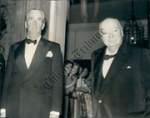
Have we not told the Russians that the only purpose of the contacts in Switzerland is to arrange a meeting at our military headquarters in Italy, where military questions will be discussed in the presence, if they wish, of a Russian representative, and that if at any moment political affairs are trenched upon the whole matter can be referred to the three Governments? It looks as if the Swiss conversations may go beyond that, if indeed they have not already gone beyond it. We have decided to ignore the insulting telegrams which Molotov has sent. This however does not relieve us of our obligation as Allies on any matter which might involve peace negotiations.

Eisenhower to Churchill:
As soon as the US Ninth and First Armies join hands and enemy encircled in Ruhr area is incapable of further offensive action I propose driving eastward to join hands with Russians or to attain general line of Elbe. Subject to Russian intentions, the axis Kassel-Leipzig is the best for the drive, as it will ensure the overrunning of that important industrial area, into which German Ministries are believed to be moving; it will cut the German forces approximately in half, and it will not involve us in crossing of Elbe. It is designed to divide and destroy the major part of remaining enemy forces in the West.
Austria is invaded by the Red Army.
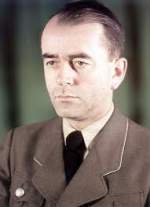
Speer—if we accept his account—after much argument, convinces Hitler to allow him to determine implementation of scorched earth policies, in this way nullifying them. From Hitler's order:
To assure uniform implementation of my decree of March 19, 1945, I hereby order as follows:
1.) The orders given for destroying industrial installations are aimed exclusively at preventing the enemy from using these installations and facilities to increase his fighting strength.
2.) No measure may be taken which would impair our own fighting strength. Production must be continued up to the last possible moment, even at the risk that a factory may fall into enemy hands before it can be destroyed. Industrial installations of all sorts, including food-producing plants, may not be destroyed until they are immediately threatened by the enemy.
3.) Although bridges and other transportation installations must be destroyed to dent the enemy their use for a prolonged period, the same effect can be achieved with industrial installations by crippling them lastingly. Total destruction of particularly important plants will be ordered on my instructions by the Minister of Armaments and War Production (e.g., munitions plants, essential chemical plants, etc.).
4.) The signal for crippling or destroying industrial complexes and other plants will be given by the Gauleiter and defense commissioner, who will supervise the process. Implementation will be undertaken solely by the agencies and organs of the Minister of Armaments and War Production. All the agencies of the party, the state and the armed forces are to assist when needed. The Minister of Armaments and War Production may, with my authorization, issue instructions for implementation. [See: Why Did Hitler Insist on No Surrender?]
1946 Nuremberg Tribunal: Day 94 of deliberations:
From the testimony of Joachim von Ribbentrop on his own behalf:
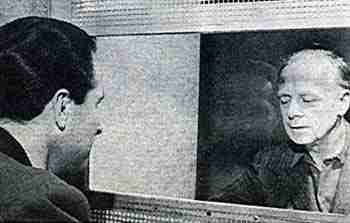
[The] attitude of the United States was not favorable to Germany after the conclusion of the Tripartite Pact. The Fuehrer's basic idea, and mine, namely, that if the United States did enter the war in Europe, they would have to reckon with a war on two fronts and therefore would prefer not to intervene, was not realized. Now the further question of Russia's attitude came up and in this connection the Fuehrer made the following statement: We have a friendship pact with Russia. But Russia has assumed the attitude which we have just been discussing and which causes me a certain amount of concern. We do not know, therefore, what to expect from that side. More and more troop movements were reported; he had himself taken military countermeasures, the exact nature of which was, and still is, unknown to me. However, his great anxiety was that Russia on the one hand and the United States and Britain on the other, might proceed against Germany. On the one hand, therefore, he had to reckon with an attack by Russia and on the other hand with a joint attack by the United States and England, that is to say with large-scale landings in the West. All these considerations finally caused the Fuehrer to take preventive measures, to start a preventive war against Russia on his own initiative. [For the rest of Ribbentrop's testimony, Click here.]
Norman Birkett (later, Lord Birkett), the British Alternate Judge, writes on this day:
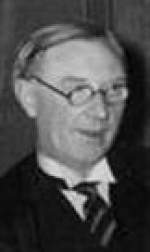
The trial is now completely out of hand. (Ribbentrop) continues to make very long answers on matters which are only indirectly relevant to the issues in the case." Later he will add: "Does the Tribunal really need any further evidence about the German attitude toward the Jews? . . . . all prosecutors should limit themselves most rigidly in the interests of time.
1948 Henry Wallace criticizes Truman's Cold War policies:
Henry Wallace, former vice-president and current Progressive Party presidential candidate, lashes out at the Cold War policies of President Harry S. Truman. Wallace and his supporters were among the few Americans who actively voiced criticisms of America's Cold War mindset during the late-1940s and 1950s. [For further details, Click here]
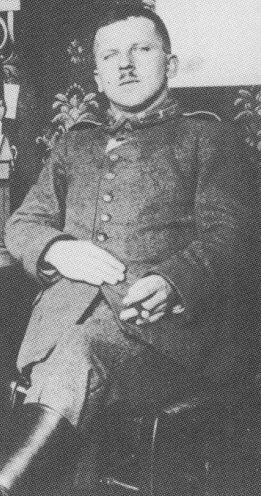
1957 Death: Max Amann: Hitler's company sergeant and one of his closest comrades during and after the First World War. [See: Hitler in World War I.]
2002 Death: Elizabeth the Queen Mother:
Queen Elizabeth, the Queen Mother, has died at the age of 101. She was queen for fewer than 15 years, during a period which is now beginning to pass out of living memory. Yet her personal popularity continued through 50 years of widowhood, unimpaired by changing public reactions to her children and grandchildren, and their mostly broken marriages.
When she married the Duke of York (later King George VI) on April 23 1923, her impact on the crowds was comparable to that of Diana's 58 years later. She had been reluctant to marry royalty--"afraid never, never again to be free to think, speak and act as I feel I really ought to". But having accepted the life, she threw herself into it, and carried her husband through the trauma of the 1936 abdication, which brought him to the throne.
History will probably honour her best for her reply in 1940--after Buckingham Palace had been bombed while the family was at home--to advice that she should follow other wealthy people in sending her daughters to Canada until the end of the war. She said: "The children will not leave unless I do. I shall not leave unless their father does; and the King will not leave the country in any circumstances." [For further information, click here.]
Edited by Levi Bookin (Copy editor)
levi.bookin@gmail.com



Click to join 3rdReichStudies
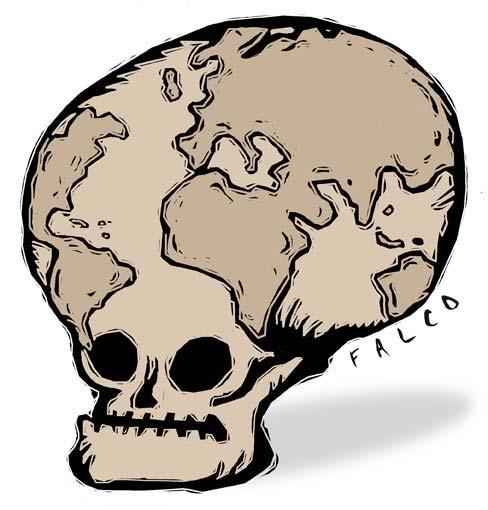
FAIR USE NOTICE: This site may contain copyrighted material the use of which has not always been specifically authorized by the copyright owner. We are making such material available in our efforts to advance understanding of historical, political, human rights, economic, democracy, scientific, environmental, and social justice issues, etc. We believe this constitutes a 'fair use' of any such copyrighted material as provided for in section 107 of the US Copyright Law. In accordance with Title 17 U.S.C. Section 107, the material on this site is distributed without profit to those who have expressed a prior interest in receiving the included information for research and educational purposes. If you wish to use copyrighted material from this site for purposes of your own that go beyond 'fair use', you must obtain permission from the copyright owner.
Please note that the list-owner and the moderator are not responsible for, and do not necessarily approve of, the random ads placed on our pages by our web server. They are, unfortunately, the price one pays for a 'free' website.